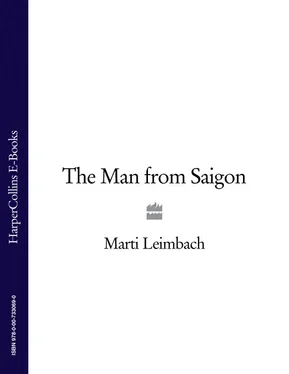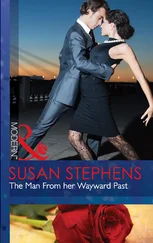She had intended to avoid them; she had intended never to come under fire at all, but as the weeks dropped away she became less certain that any kind of safety could be ensured even within Saigon, let alone if she went to crazy places like Con Thien. That had been a mistake; that had been chancing it.
But even on supposedly safer ground there were no guarantees. She’d been a block away when a small bomb blew up a diplomat’s car. The next day a bar frequented by Americans took a grenade, injuring dozens and killing two soldiers and three of the bar girls who drank overpriced “tea.” Even so, Saigon itself did not frighten her. The assaults she suffered were not by artillery but by the prostitutes on Tu Do Street who called her names as she passed. Or when she walked, trying to stay beneath the thin shade of the plane trees, and soldiers sidled up to her asking where she was from, what was her name, where was she going. The hotel was one street down from the flower market and sometimes the air around it was so fragrant that if she shut her eyes she could make herself believe she was in the lushest garden in all of Southeast Asia. At night, the smell of flowers disappeared and the rats arrived, traveling up from the rivers, feasting on garbage. Beneath streetlamps the air clouded with insects. There were candy shops that sold Belgian chocolates and marzipan flown in from Spain, restaurants that brought in fresh lobster so that you could choose your own dinner from a tank. In the cosy heat of early evening, sitting on the terraces of the better restaurants, she would look up at the colorful sky, its reds and oranges set like a painting above her, unable to imagine anything more beautiful.
But there was contrast at every corner. People slept outdoors in the shaded entrances to shops, or flat out on benches, or sometimes curled on the steps of the cathedral until moved on. Market stalls sold goods quite obviously wrangled from the military post exchange or off the bodies of dead soldiers: combat fatigues, helmets, boots, even guns if you followed the vendor to the back room where they were kept. Old women sold tea, Marlboros and marijuana. Some sold only marijuana. Children sold pictures of naked girls, and the older ones sold the girls themselves. They stole the pens from your pockets, wrangled spare change from your hand. She lost a camera the first week and had to buy a new one. That is, purchase someone else’s camera, also stolen, but now displayed on a cardboard box propped up in a makeshift stall.
She was settling in, getting to know the places to meet, who to speak to, where to go, but also she registered an unease that (she would learn later) never truly lifted from a visitor to Saigon. The city surprised her in a million ways. There were mysterious chirpings and whistles that arrived with dawn, along with the onslaught of traffic, a ceaseless commotion that exhausted her as much as the temperature that she measured not in degrees but by how many times each day she had to immerse herself in water.
There were other sounds, too, that required attention. One night, shortly after her arrival, she heard something like thunder that confused her senses, making her imagine a storm when the night was clear. But the storm was not the reason for the noise; it was bombing to the west of the city, which from the street she could not see, but thought she could feel, detecting a kind of vibration in the air. The sound of the bombers was heard not only as thunder, but in a sudden heightened awareness of people around her, who appeared to step up their pace, or crowd themselves at doorways, or create even more knots of traffic in the swarming streets. The war registered itself in the way the window glass rattled, how the strings of lights upon railings flickered and were still. Closet hangers danced, making their tinny sound; dogs that roamed freely began to shout into the night.
In Susan’s own small room the pendant lamp above her bed was set in motion, barely noticeable, as rhythmic as a metronome. Plaster broke away and splattered on the floor, the war approaching and receding like a tide. Even if she wasn’t in the room at the time, she would notice upon her return the broken tile, the settling of dust, feeling almost as though someone had been through her things and moved them all a millimeter or two in a ridiculous but unsettling act. Sometimes, with a group of other journalists, she stood on the rooftop terrace of the Caravelle Hotel, watching the bombing, tracking tracers and bullets many miles off that poured from the guns of a US airship as though from a firehose. She watched the sudden red of bombs meeting their targets, trying to determine exactly where they were falling. There really was no more to it than that. She hadn’t thought about what it would be like to be on the receiving end of artillery, or to be under those bombs. In her cocktail dress recently purchased from Marshall Field’s, during those first few weeks in Saigon, while clasping the delicate stem of a drink from someone she’d just met, whose name she couldn’t recall as she clinked his glass, she could not imagine such things.
It turned out not to be a matter of time, but of distance. It was a decision you made, where you put yourself in the country, who you traveled with. It began slowly enough, going out with soldiers until something—an angle, a profile, an interview, a sudden, newsworthy event—happened her way. It had almost become a game she played—how close could she get to the war without getting too close. She wore chinos and a short-sleeved blouse, interviewing those who set up refugee camps and orphanages, her hair limp in its ponytail, her cheeks newly sprinkled with freckles. A gradual change was taking place; she settled into her role. She realized two weeks into what was now being called her “tour,” while trudging through a dusty, crater-filled village, barraged by gangs of children demanding their piastres, swearing in mixed-up English at her if she didn’t pay, that it was precisely because she hadn’t hungered after battlefields, and in fact had no definite opinion one way or another on whether the war was ethical or winnable, that she’d been sent in the first place. The magazine would never have chosen a “political” reporter. They’d chosen her because she was quirky enough to train horses in her spare time and because they thought—they really did think—that she would never leave Saigon. That is, all except her editor. She’d received a telegram a few days earlier:
GET STORIES OUTSIDE THE CAPITAL STOP YOU ARE AS GOOD AS ANY OF THEM STOP
She carried that telegram with her for days. It made her think she could do it, made her know. It was still too early for her to have bad dreams; too early for her to be woken in the night by them. She wished only to understand truly what was happening in this one small country and everything she did was a process of this unfolding. It was not unpleasant. Quite the contrary: it was exhilarating. The trip up to Con Thien had both terrified and intrigued her. She then went to Pleiku and wrote a good story about a small hospital there. That was when she came across Son, whether by fate or by deliberate intent on his part, she never knew. The country was full of random occurrences and anyway it was not surprising that she should meet him—everyone knew him. While Western correspondents came and went, staying a few weeks or a few years, their numbers growing exponentially with each season, Son remained, a kind of ambassador to the war. He’d watched the number of newsmen in Vietnam increase tenfold and more. He’d watched Saigon fill up like a dam.
His full name was Hoàng Van Son. He had a couple of identical Nikon F cameras, a heavy zoom lens which was a recent acquisition, and he filled his pockets with Ektachrome color and a few rolls of Kodak Tri-X black and white just to walk down the street. He had a long mouth that curled up at the ends, blocky white teeth that aligned as though he’d had years of orthodontistry, which he most certainly had not. He was quite handsome—Susan thought so—but in a way she was not used to and which kept her from fully acknowledging it. He spoke English very well—that was the main thing. He knew how to cover the war. They decided to form a partnership, him as a still photographer, her as a print reporter. He was her friend—she believed they were friends—and also her translator and her entrance into combat reporting. One afternoon, still during those early weeks in Saigon, he showed her how to fall to the ground when mortared. That is, he tried to convey how fast she needed to move. But she didn’t understand.
Читать дальше












